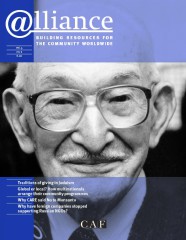Charitable giving in Judaism
Through the centuries Jews have regarded the giving of charity as a central religious act. In Jewish teaching, charity is perceived as a divine attribute, and God is seen as exercising charity: ‘He doth execute justice for the fatherless and widow and loveth the stranger, in giving him food and raiment’ (Deuteronomy 10:17, 18). It is charity not sacrifice that will find favour with God. In ancient times, taxes were levied for the benefit of …
Editorial
Editorial – June 2000
As I sat at my computer wondering what to write, I picked up an email message announcing a new World Bank study. Voices of the Poor, it is claimed, ‘gathers the voices of 60,000 poor men and women from 60 countries’. This reminded me of something I know only too well: that if there is one thing in which Alliance is failing (I’m sure there are many), it is in reaching sufficiently into these and other poor countries, in terms of both writers and subject-matter. It is something I am constantly trying to put right. Having said that, I have …
Editorial – How multinationals arrange their community programmes
This series of commentaries from the corporate sector testifies to a time of rapid change and rethinking in philanthropic approaches: in focus, geographical reach, process, even in the way business defines its role. ‘Multi-local’ seems to be the template for programme delivery for many multinationals, which are trying to create global branded philanthropic initiatives with variants that respond to local circumstances. Increasingly these programmes are delivered in partnership with non-profits, other foundations and aid agencies. The need to evaluate and control – to be more ‘businesslike’ – is causing some companies to enter into tighter, more close-ended agreements with their …





